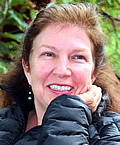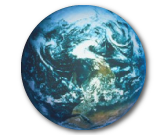 Sandy Andelman joined Conservation International as the Senior Director of the Tropical Ecology, Assessment and Monitoring (TEAM) Initiative in 2005, after spending seven years as Deputy Director for the National Center for Ecological Analysis and Synthesis (NCEAS) at the University of California, Santa Barbara, where she also was an Adjunct Professor in the Department of Ecology, Evolution and Marine Biology. Dr. Andelman has more than 25 years of experience as a conservation scientist, working in North America, Africa, Asia and Australia. She has a PhD in behavioral ecology from the University of Washington.
Sandy Andelman joined Conservation International as the Senior Director of the Tropical Ecology, Assessment and Monitoring (TEAM) Initiative in 2005, after spending seven years as Deputy Director for the National Center for Ecological Analysis and Synthesis (NCEAS) at the University of California, Santa Barbara, where she also was an Adjunct Professor in the Department of Ecology, Evolution and Marine Biology. Dr. Andelman has more than 25 years of experience as a conservation scientist, working in North America, Africa, Asia and Australia. She has a PhD in behavioral ecology from the University of Washington.
Dr. Andelman serves on the Group on Earth Observations Biodiversity Observation Network (GEO-BON) ecosystem services and species working groups, participated in the design team for the U.S. National Ecological Observatory Network, led the pilot project for the Africa Monitoring System and served as deputy director of the U.S. National Center for Ecological Analysis and Synthesis. Andelman wants to help create a new culture of ecology; one that is relevant to our increasingly connected world. She envisions dynamic, diverse networks of scientists that transcend organizational and national boundaries, collaborating across the globe. Using unified methods and innovative informatics and mobile technologies, she aims to create global public data resources and forecasting and problem-solving tools to tackle some of the world’s most important environmental problems.
Return to Board Members Index

